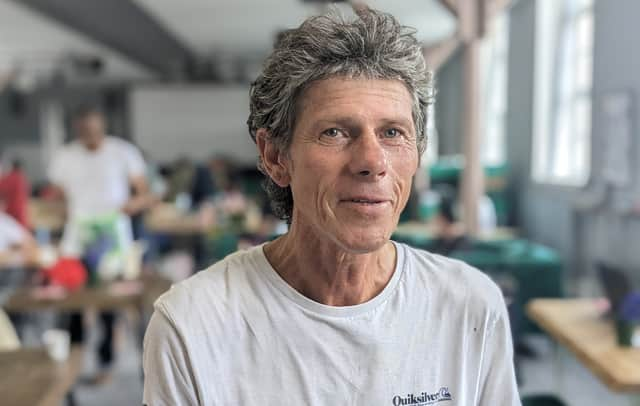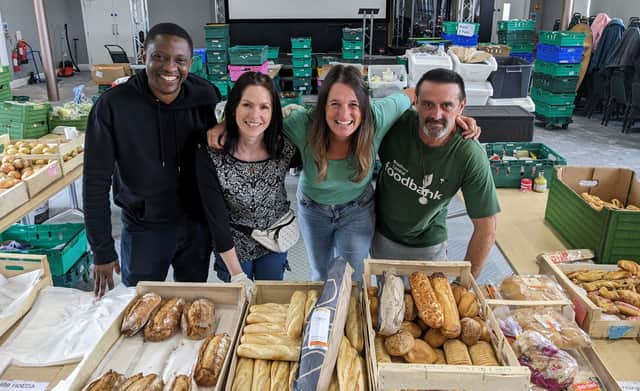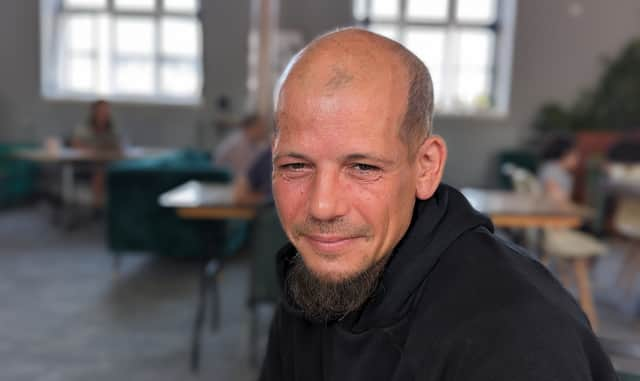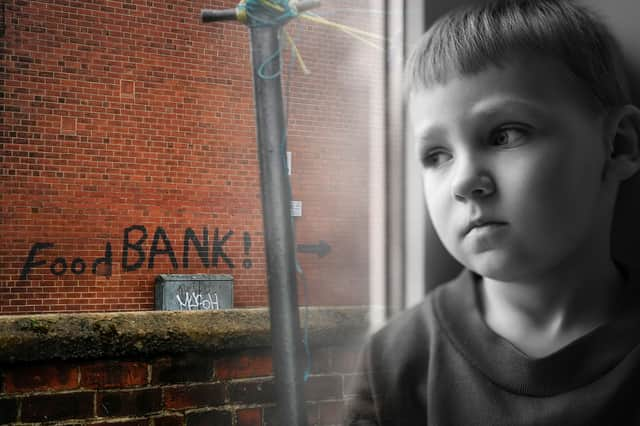Number of children in extreme poverty has almost trebled since 2017 - foodbanks are concerned it may get worse
and live on Freeview channel 276
When Josie Barlow started working at the Bradford Central foodbank in 2018 it was looking after up to 400 people a month. This year, in September, almost 1,500 food parcels were given out.
“The cost of living crisis is hitting us harder than Covid did,” manager Josie tells me. “This year we’ve seen a 23% increase in the amount of people coming in, in the first eight or nine months, compared with last year. Winter always gets a lot busier, so we are predicting another 35% increase on that.”
Service users told NationalWorld that they only have between £50 and £80 for food left after paying their rent and bills, while this website previously reported that the prices of value-range food and drink items have risen well above inflation. Steven Farrar said: “I have nothing left … I walk everywhere and can’t afford a phone.”
So it was little surprise to campaigners that a Joseph Rowntree Foundation report found that almost four million people in the UK, including more than a million children, experienced the most extreme form of poverty last year. That’s when someone cannot afford to meet their most basic physical needs to stay warm, dry, clean and fed.


That figure is more than double the amount of people who were in extreme poverty in 2017 (1.55m), while the number of youngsters has almost trebled since then - from 362,000 to 1.04million. The report – the fourth in a series of Destitution in the UK studies published regularly in recent years – puts the rise down to a combination of very low incomes, rising cost of living and high levels of debt.
But it also said the social security system is failing to protect people from destitution, with almost three quarters (72%) of those destitute being in receipt of benefits. And this is something Josie has found common among people using the Bradford Central Trussell Trust foodbank.
“In the main, it’s people that are struggling to survive on Universal Credit - whether they’re working or not working,” she says. “Bradford West has the biggest percentage of working-age adults on Universal Credit. It’s purely the fact that people’s basic income isn’t enough, it hasn’t really gone up with inflation.” And people are left to take money from Universal Credit to top up their housing benefit for rent, Josie explains.


So Bradford Central foodbank user Lee says: “Even when I have paid for all my basics and bills, I'm left with less than £50 for the whole month. I can't afford to top up my phone, buy food, or even replace my trainers before winter.”
In April, Universal Credit and other welfare benefits were uprated by 10.1% in line with inflation. Since then, inflation has continued to increase, while food inflation has consistently been higher - above 16% for much of the last 12 months.
And NationalWorld found that prices for value-range food, drink and cleaning products at UK supermarkets rose by more than a quarter - a higher rate than inflation - between 2022 and 2023, something which affects the poorest in our society the most.
There’s been a 41% markup on pasta at Aldi, a 69% rise on sausages at Asda and a 119% hike on marmalade at Tesco and Sainsbury’s, with shoppers who rely on supermarkets’ basic food lines facing truly staggering inflation over the past year, with almost nine out of 10 of the cheapest products on shelves getting more expensive. Budget eggs, cheese, fruit, meat and biscuits are among the products to see the biggest price hikes, according to the NationalWorld investigation.
One family using the Bradford Central foodbank told NationalWorld: “The cost of living crisis has pushed up food prices. We have four children and it’s hard to keep them fed. We have to buy halal meat from the butchers which adds to the cost. It’s hard to get them clothes and as they get older they want nicer things. We just don’t have enough money and we’re living off our overdraft.”


While single people aged between 25 and 44 years old remain the key group experiencing destitution, more families and older people are now destitute, the Joseph Rowntree Foundation said. It is more often being left to charities to try to plug gaps for people in desperate situations, the report said.
It stated: “The shocking statistics revealed in this report reflect a social security system now so full of holes that it falls to charities – such as food banks – to try to prevent people from experiencing the worst of destitution, but the task is too great for them. What is more, relying on charity to fulfil what should be the responsibility of the Government is morally unacceptable.”
Sadly, the Trussell Trust believes that a record of more than one million emergency parcels could be handed out this winter due to an ever-growing need. Emma Revie, chief executive, said: “We don’t want to spend every winter saying things at food banks are getting worse, but they are. Food banks are not the answer in the long term, but while we continue to fight for the change that could mean they can be closed for good - your local food bank urgently needs your support.”
While people have started taking to crowdfunding to cope with the cost of living crisis for essentials from school uniforms to baby formula. From January to October 2022 compared with the same period this year, GoFundMe found an 85% increase in fundraisers mentioning the “cost of living”. While comparing 2022 to 2021, there was an incredible 1,273% increase.


Josie Barlow says some things the government has been doing have clearly been working. The cost of living grants - which have been coming out quarterly - have led to a “massive dip in numbers” of people visiting the Bradford Central foodbank. “There’s a proven case that if you give people the right amount of money, food bank usage does drop,” she says.
Labour’s Shadow Work and Pensions Secretary Liz Kendall said the Joseph Rowntree Foundation study “It is a damning indictment of this Conservative government that a million children experienced destitution in the last year”.
“The Tories crashed the economy, unleashing a cost of living crisis with a society that now has more food banks than police stations. Labour has a plan to grow the economy to put money back into people's pockets, make work pay, and deliver a bold, new cross-government child poverty strategy.”
However Josie said the two-child benefit cap - which Labour has said it wouldn’t scrap due to economic constraints - is causing significant hardship. “That’s really tough, that’s what I think is really hitting families and kids, especially bigger families,” she added.
A UK government spokesperson said: “Our number one priority is driving down inflation because that will help everyone’s money go further.”
The spokesperson outlined financial support “worth an average of £3,300 per household” which has been provided to date, as well as an investment of £3.5 billion to help people into work, and the expansion of free childcare.
Charities such as the Trussell Trust are hoping Chancellor Jeremy Hunt will announce a rise in benefits which is at least in line with inflation when he makes his autumn statement on 22 November – although Downing Street has declined to make any commitment, saying there is a process to follow.
Comment Guidelines
National World encourages reader discussion on our stories. User feedback, insights and back-and-forth exchanges add a rich layer of context to reporting. Please review our Community Guidelines before commenting.
